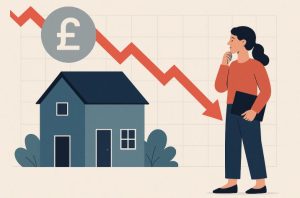For many UK homebuyers, the last few years have felt like riding a financial rollercoaster. With interest rates swinging wildly, homeowners and prospective buyers have been left wondering: are mortgage rates going down in the UK or is this just another false dawn? In 2025, this question has become more urgent than ever.
Just a few years ago, following the economic aftershocks of 2022’s mini-budget, fixed rates were flipped on their head. Five-year and ten-year fixed mortgage rates became cheaper than their two-year counterparts, a rarity in the mortgage world.
This guide explores everything homebuyers need to know, breaking down the latest figures, forecasts, expert opinions, and actionable tips to help make sense of where mortgage rates are really headed in the UK.
Why Are Fixed Mortgage Rates Fluctuating in Late 2025?

In the past, shorter-term fixed mortgage rates often came with lower interest compared to long-term fixes. This pattern is slowly re-emerging in 2025. For the first time since 2022, average interest rates on two-year fixed mortgage deals are now lower than five-year fixes.
Mortgage Rates as of September 2025
| Term | Average Rate | Best Available Rate |
| 2-Year Fixed | 4.52% | 3.78% (Yorkshire BS) |
| 5-Year Fixed | 4.55% | 3.80% (HSBC) |
| Standard Variable Rate | 7.42% | N/A |
This return to the norm is largely a result of increased confidence in short-term interest rate stability. But not all is steady. In September 2025, major lenders such as Barclays, Nationwide, and Virgin Money nudged their fixed rates upward again. Barclays, for instance, raised its five-year fix to 4.05% and its two-year fix to 3.85%.
Why This Is Happening?
- Lenders are reacting to inflation concerns
- Bank of England rate cuts have been cautious and delayed
- Funding costs are rising slightly, impacting fixed rates
Although interest rates were expected to fall more quickly this year, hesitation from the Monetary Policy Committee has caused lenders to act defensively, nudging rates back up to protect their margins.
What Does the Latest Bank of England Rate Cut Mean for Borrowers?
On 7 August 2025, the Bank of England reduced the base rate from 4.25% to 4%. While this move was widely anticipated and already priced into many fixed-rate deals, the narrow 5:4 vote on the cut caught markets off guard.
Key Bank of England Rate Cuts Timeline
| Date | BoE Base Rate |
| Jul 2024 | 5.25% |
| Nov 2024 | 5.00% |
| Feb 2025 | 4.75% |
| May 2025 | 4.25% |
| Aug 2025 | 4.00% |
The current base rate is now significantly lower than it was during the peak of inflationary response in 2023–2024. However, the uncertainty around future cuts is keeping the mortgage market cautious.
Market Sentiment
- HSBC predicts the next base rate cut won’t come until April 2026
- The Monetary Policy Committee is divided, signalling hesitation
- Economists are scaling back predictions of aggressive rate cuts
So, while the base rate is technically lower, it doesn’t automatically translate to cheaper mortgage deals in the immediate term, particularly for fixed-rate products.
Are Mortgage Rates Going Down UK – Or Is This a Temporary Dip?

It’s tempting to celebrate any dip in mortgage rates as a long-term trend, but this moment in 2025 might be more of a temporary correction than a clear shift downward.
The current uptick in fixed-rate mortgages contradicts the falling base rate. Lenders are pre-emptively adjusting to potential delays in future rate cuts and higher-than-expected inflation data.
Influences on Mortgage Rate Movements
- Bank of England decisions take time to filter into lending
- Funding costs for banks have slightly increased
- Market confidence is wavering due to global and domestic pressures
According to David Hollingworth of L&C Mortgages, fixed rates are being “edged up slightly” due to slim lender margins and a highly competitive environment.
He notes that securing a mortgage deal now could be the best move, as lenders may continue hiking rates in anticipation of longer-term volatility.
What Type of Mortgage Deal Is Best in the Current Market?
The right mortgage deal depends on your personal situation, and how much risk you’re willing to take.
Comparing Mortgage Types
| Type | Current Trend | Who It’s Best For |
| Fixed-Rate (2 or 5 Yr) | Rising slightly | Those seeking payment stability |
| Tracker Mortgages | Gaining popularity | Those expecting further base rate cuts |
| Discounted Variable | Mixed pricing | Those with flexibility in budgets |
| Standard Variable (SVR) | Very high | Should be avoided if possible |
In volatile times, fixed-rate deals offer predictability but may lock you into a higher rate if the base rate drops further. Trackers, on the other hand, can save money if cuts continue, but they carry risk.
How Are Inflation and Global Events Affecting UK Mortgage Rates?

Mortgage rates don’t exist in a vacuum. Global events and broader economic trends play a vital role in shaping lender behaviour in the UK.
Key Global and Domestic Influences
- War in Ukraine: Energy price surges led to higher inflation
- Post-pandemic inflation: Forced central banks to react aggressively
- US Politics: Market volatility driven by trade and tariff concerns
Inflation remains a primary concern for the Bank of England. If inflation stays high, future rate cuts may be delayed, and mortgage rates may stay elevated despite recent base rate reductions.
Should Homebuyers Lock in a Rate Now or Wait?
Timing the mortgage market is tricky, and many experts advise against trying to “guess” future rate movements.
Why Locking In Might Make Sense?
- Rates under 4% may not last long
- Most deals allow a recheck before completion
- Lenders are quietly nudging rates upward again
Some lenders offer rate-lock periods of up to six months. This gives buyers and remortgagers the chance to lock in a competitive rate today and still switch to a better one if the market improves.
Key Benefits
- Avoid SVR pitfalls
- Reduce uncertainty in monthly payments
- Take advantage of limited-time offers
How Do Changes in Interest Rates Affect Existing Mortgages?
Not all mortgages respond the same way to interest rate changes. Here’s how different mortgage types are affected:
Tracker Mortgages: These follow the Bank of England base rate. If the base rate drops by 0.25%, so will your mortgage rate.
Example:
| Mortgage Type | Rate (%) | Monthly Payment (£) |
| 5% Tracker | 5.00 | £1,169 |
| New Rate | 4.75 | £1,140 |
| Monthly Saving | — | £29 |
Fixed-Rate Mortgages: Monthly payments remain unchanged until the deal expires. Ideal for those who want budget certainty.
Discounted Variable Rates: These track a lender’s SVR with a discount, but lenders may not pass on base rate cuts in full.
Standard Variable Rates (SVR): Generally much higher and not tied to the BoE rate. Currently averaging 7.42%, significantly higher than the best fixed deals.
Are Mortgage Rates Going Down UK for Remortgagers Too?

Yes, remortgagers are also seeing opportunities, especially compared to deals from 2023 and 2020.
Rate Comparison
| Year | Average 2 Yr Fixed | Monthly Payment (on £200k) |
| Sep 2023 | 6.70% | £1,290 |
| Sep 2025 | 4.52% | £1,016 |
| Monthly Saving | — | £274 |
Even if your new deal is slightly higher than your current one, you might still save by avoiding the SVR.
What Should You Know If You’re on Your Lender’s SVR?
Standard Variable Rates (SVR) are the default rates lenders offer once your fixed or tracker deal ends. These rates are currently averaging 7.42%, making them the most expensive mortgage option.
Why You Should Avoid SVRs?
- They are not tied to the Bank of England base rate
- Lenders can change them at any time
- Monthly payments can spike unexpectedly
If you’re on an SVR, act fast to secure a fixed or tracker deal and reduce your payments by hundreds per month.
Is 2025 a Smart Year to Start the Remortgage Process?
With lower fixed-rate deals returning, many experts agree that 2025 is a strong year to consider remortgaging, especially if your current deal is ending soon.
Factors to Consider
- Check your deal’s expiry date: If it ends within six months, act now
- Use a rate-check tool: This helps you compare deals regularly
- Fixed vs Variable: Fixed may offer peace of mind, but variable deals could be cheaper if rates fall
Mortgage Payment Comparison
| Year Locked In | Average Fixed Rate | Monthly Payment (£) |
| 2020 (2.49%) | 2.49% | £789 |
| 2025 (4.55%) | 4.55% | £1,019 |
| SVR (7.42%) | 7.42% | £1,387 |
Conclusion
Mortgage rates in the UK are in a state of cautious flux. Despite a recent base rate cut to 4%, most fixed-rate mortgage deals are slowly creeping up again.
Lenders are responding to inflation fears, market uncertainty, and slow progress on interest rate reductions.
FAQs
What is the average mortgage rate in the UK right now?
As of September 2025, the average two-year fixed mortgage rate is 4.52%, and the five-year average is 4.55%.
Is it a good time to remortgage in 2025?
Yes, especially if your deal ends within the next six months. Rates are lower than they were in 2023, and remortgaging now could help avoid high SVR costs.
Will the Bank of England cut interest rates again this year?
It’s unlikely. Economists now expect the next cut to come around April 2026 due to ongoing inflation fears.
Why are fixed mortgage rates rising despite a base rate cut?
Because the market had already priced in the rate cut. Funding costs for lenders are also increasing, pushing rates higher.
Can I lock in a mortgage rate and change it later?
Yes, many lenders allow you to lock in a rate and switch if a better deal becomes available before your mortgage is finalised.
How do interest rate changes affect tracker mortgages?
Tracker mortgages directly follow the Bank of England base rate, so any change in the base rate will impact your monthly payments.









